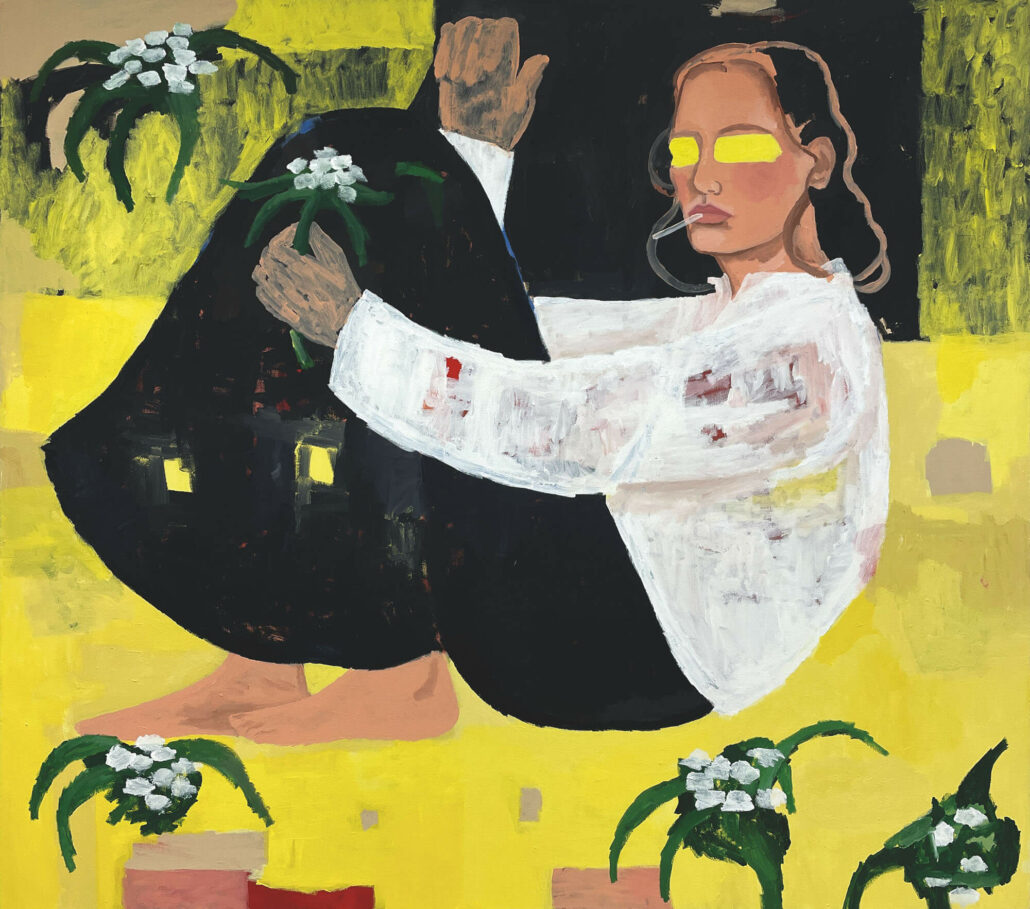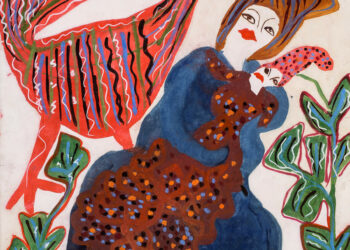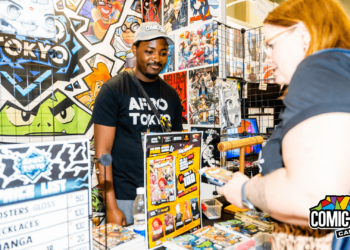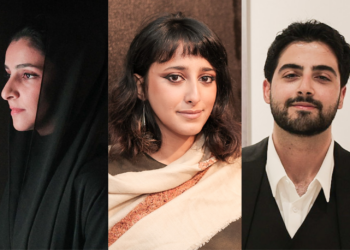The European Cultural Centre (ECC) presents the seventh edition of ‘Personal Structures’ which will open in Venice, Italy, on the 20th of April and run until the 24th of November, 2024.

Lunita-July Dorn, Occhio, Malocchio, Prezzemolo e Finocchio (Auge, böses Auge, Petersilie und Fenchel), 2024. Courtesy of the artist and Destinee Ross-Sutton
“Delving into the challenges of global migration and the intricate web of national identities, ‘Personal Structures’ emerges as a vital artistic dialogue, transcending borders and reflecting the complexities of our interconnected world.” This is how Sara Danieli, Head of Art at ECC Italy, describes the seventh edition of ‘Personal Structures’. The biennial art exhibition, organised by the European Cultural Centre (ECC) in Venice, will welcome visitors from the 20th of April until the 24th of November, 2024 in the historical venues of Palazzo Bembo, Palazzo Mora and Marinaressa Gardens. Press previews and openings will occur on the 18th of April and the 19th of April.
Considering the complex dynamics of our global society, Beyond Boundaries was chosen as the guiding title of ‘Personal Structures’ 2024. The collective show will present itself as an exhibition and a journey that will cross multiple boundaries – geographic, political, religious, cultural and artistic. While some physical and conceptual limits can mean comfort and safety – our bodies, the walls of our homes, the lines on the road – the exhibition will aim to shift these constraints, to investigate what is beyond to see it from a different point of view.
By bringing together more than 200 artists and multidisciplinary creatives from 51 different countries, ‘Personal Structures’ seeks to provide a rich tapestry of perspectives on the pressing challenges of our time. The protagonists of this year’s group show will be renowned as well as emergent international multimedia artists, photographers, sculptors, and performers, along with art and academic institutions and galleries, who will articulate their visions, reflections, and responses to the multifaceted aspects of today’s society.
Exhibitors explore their cultural backgrounds, revealing an array of approaches on national and cultural identity. In parallel with her current Tate Modern exhibition, Yoko Ono showcases at Marinaressa Gardens an inspiring work which looks at the present moment, imagining and hoping for utopian world peace. Strengthening a collaboration that started in 2022, the Palestine Museum US presents at Palazzo Mora Foreigners in their Homeland, an exhibition curated by Faisal Saleh featuring a selection of Palestinian multimedia artists. Focusing on the contemporary art of the Sinti and Roma communities is the site-specific installation Rroma Lepanto, which comprises artists brought together by the Foundation Kai Dikhas at Palazzo Bembo.
The show highlights indigenous cultures and features numerous artists based in Asia in countries such as Taiwan, Japan, and China, as well as artists and galleries from the Global South, including countries such as the Philippines, Seychelles, Colombia, Argentina, Venezuela, Nigeria, and India. Paying homage to Native Americans and their ancient connection to Asia is David Middlebrook with The Return, a life-size birch-bark canoe outfitted with bronze bamboo legs. In The Rhapsode’s Tools Will Build the Rhapsode’s House, artist Areez Katki displays nine tiles made with kaolinite clay found in his family’s backyard in New Zealand (Aotearoa) to create a sensitive portrait of his late grandmother together with 17 embroidered handkerchiefs respond to the 17 Ha’s from Zarathushtra’s Gathas. On the other hand, Robert Jahnke’s Te Wepu MMXXIII is a tribute to the Māori prophet Te Kooti Arikirangi Te Tūruki (1830-1893). His neons in the shapes of the crescent moon, cross, mountain, bleeding heart and star, whose colours allude to the Union Jack, are invested with significance to reinvigorate the symbols of resistance within the neo-colonial present.
Karima Mohamed Abdelaziz uses art as a medium to tell stories about her Emirati heritage. She reinterprets notions specific to women’s clothes, jewellery, and accessories, shedding light on the nuances of women’s rich fashion rituals and paying homage to recognised symbols of tradition such as the burqa. Looking at identity through the lens of gender is the group of female artists presented by the Ross-Sutton Gallery. They transform one of the rooms at Palazzo Bembo, investigating the subject of female sexuality, looking at their bodies and experiences, and exploring how women navigate the world within the changes that occur constantly.
Drawing from both Eastern and Western philosophy, the humanities, and the science of cosmogenesis and phenomena, artist Shen Chang Ming channels the overly romantic aspects of life towards a rational balance. His paintings result in abstract landscapes composed of colourful dots, lines and Kanji, which help him overcome his own experiences of loss and separation through religion and rationality, creating a universal language. At Palazzo Bembo, the intimate photographs of Elizabeth Heyert speak of loss and grieving. She explores spirituality and the afterlife, capturing, as an outsider, corpses of the last journey of more than thirty people at the Harlem funeral home of Isaiah Owens.
Important to mention is also photographer Sandra Cattaneo Adorno, who, in her exhibition Ten Years, delves into different layers of the in/visible world, using the inverted image to explore negative space symbolically. Combining classical and contemporary symbolism is Micky Hoogendijk, who, through her four-metre bronze sculpture, seeks to evoke immersive encounters where observers merge with the sculpture, guided not just by sight but by a visceral and emotional connection.
Palazzo Mora becomes the stage for a compelling dialogue between Hermann Nitsch, renowned for his visceral creations, and Miles Greenberg, known for his daring live performances. Drawing inspiration from the late Viennese Actionist painter, Greenberg presents for the first time a still from his seven-hour performance piece, Fountain I, showcased alongside Nitsch’s work, Schüttbild mit Hemd (Kreuzwegstation), an integration of one of his Malhemd (painter’s overshirt) pieces.
Various installations bring attention to climate change, greenwashing and sustainability discourse. British acclaimed sculptor Emily Young presents a series of sculptures in Marinaressa Gardens and Palazzo Mora, which provide an impressive example of the use of stones she finds in abandoned quarries, stone yards, and wild places. Faiza Butt adopts the pressing issue of climate anxiety and handles it in an aesthetically rich and poetic manner. She displays a series of large elaborated oil paintings inspired by the ‘Menagerie’ tradition of the Dutch golden age, scenes of paradise tainted by the traces of human materialism, polluting nature’s purity.
The central stage is also given to research and education with the installations presented by Bremen University (Germany), Deakin University (Australia), Princeton University (USA), University of Southern California (USA), and Joshibi University of Art and Design (Japan). A selection of works by students and academics showcased between Palazzo Bembo and Palazzo Mora look at what role the University should play in the next generation and navigate the problem of Venice with an art project linked to the city itself. The group show encourages visitors to experience diverse artistic narratives that challenge preconceptions and invite contemplation. Through paintings, sculptures, installations, and performances, exhibiting artists navigate the intricate current global landscape, offering insights that extend beyond the conventional and open pathways to new conversations. The exhibition becomes a testament to the richness that arises when diverse voices converge.
For more information, please visit Personal Structures.



